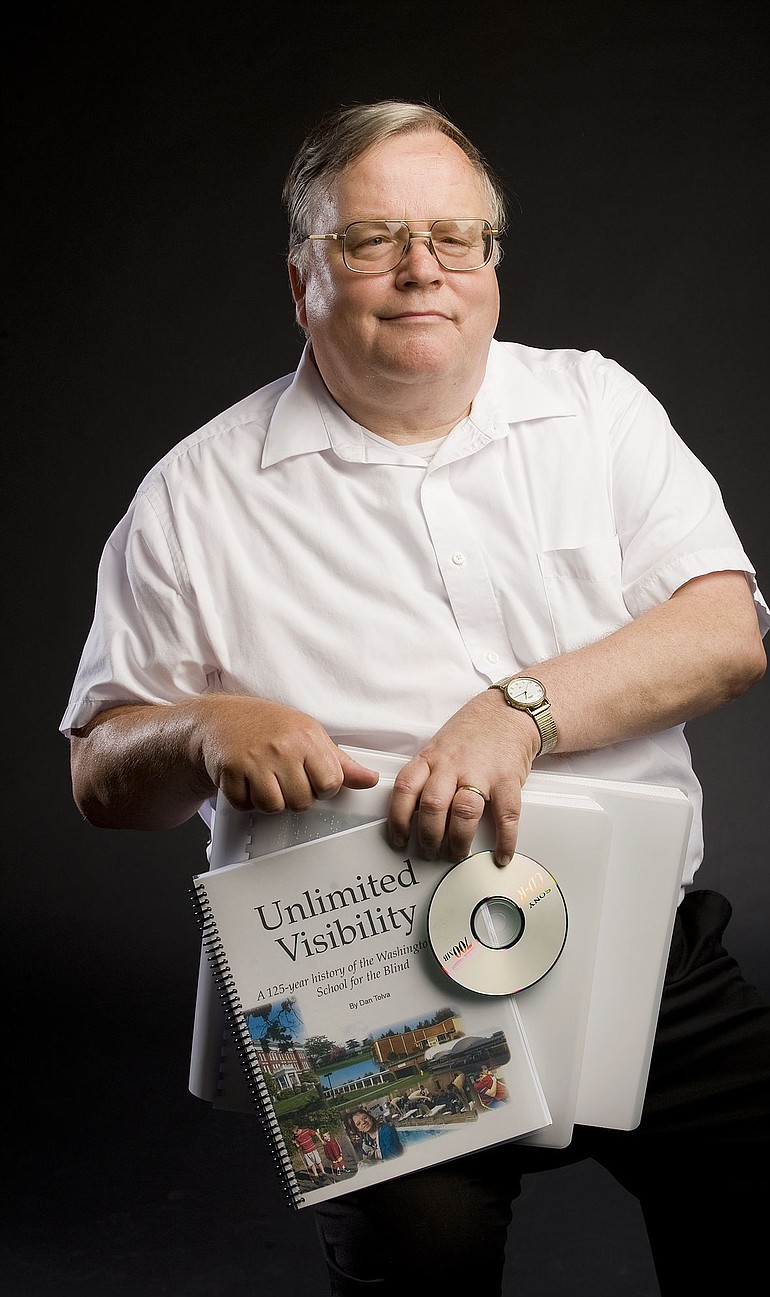Dan Tolva likes to joke that he’s a graduate from the Washington State School for Defective Youth. Of course, that wasn’t the school’s name when he attended Washington State School for the Blind in Vancouver from 1955 until he graduated with a high school diploma in 1967. But it was the original name for the school, which was established by Washington’s territorial Legislature in 1886.
During a recent conversation, Tolva let the school’s original name hang in the air. The 61-year-old Tolva steepled his fingers and grinned from the armchair in his Vancouver home.
“Unlimited Visibility:
A 125-Year History of the Washington State School for the Blind”
By Dan Tolva
Available in large print, Braille or as an audio book, $25. Information: Janet Kurz, 360-696-6321, ext. 120.
“It wasn’t a matter of being cruel,” Tolva said. “They (the school’s founders) were doing the best they could with their understanding of the day.”
Tolva, who retired from The Columbian in 2009 after nearly 37 years as a reporter and copy editor, recently wrote “Unlimited Visibility: A 125-Year History of the Washington State School for the Blind.” The book, commissioned by Washington State School for the Blind to commemorate its 125th anniversary, chronicles the history of the school, some of its students and superintendents. Alongside first-hand accounts of life at the school, it tosses in a few colorful stories and lore.
About 100 copies have sold so far. Available in large print, Braille and as an audio book, it fetches $25 and can be purchased from WSSB. Call Janet Kurz at 360-696-6321, ext. 120, for ordering information.
Tolva, who is legally blind — his good eye has 20/200 vision, which means he can see at 20 feet what a person with 20/20 vision can see at 200 feet — set out to write the book about a year after his retirement. As he did while working at the paper, he magnified his computer’s display to read the screen. It was a two-pronged endeavor for Tolva: He was looking for a project to busy himself with after his retirement and he wanted to chronicle the school that nurtured him during much of his youth.
Tolva, a surviving twin whose brother died shortly after being born, was born two months premature and his sight was damaged because of too much oxygen in his incubator after birth. He said the school was both an educational experience, and a source of stability and direction.
“School was really an anchor for me,” Tolva said. “Parents have a tough time raising blind kids.”
Tolva lived at the school most of the time, save holidays, weekends and summer vacations. With his parents moving frequently, school was a stable place to learn about life.
He recalls the often-recited words of a beloved teacher, Hazel Barnes:
“‘Use the brains that God gave you.’ I thought that was great academic and theological advice,” Tolva said.
For Dean Steneham, the superintendent of Washington State School for the Blind, Tolva’s book project was a chance to record the school’s history.
“The school has compiled, over the years, a lot of information, but it’s never been pulled together into a succinct book or history,” Steneham said, adding that the school still has the first student application for enrollment from 1886.
Pat Jollota, local historian and retired Vancouver City councilor, said she was thrilled with the book’s rich history.
“It’s important because it’s such a big part of the community,” Jollota said. “It tells why we are where we are today.”
With the book project complete, Tolva would like to create a coffee table-style book about the school, a project that he originally wanted to do but became too expensive. He’s also got his sights set on creating a film documentary about Washington State School for the Blind.
“I really do think there are lessons to be learned for all of society,” Tolva said.
The tale
The story of Mr. Finnegan, the burro, and a school prank, an excerpt from “Unlimited Visibility.”
“It seems a couple of boys who shall remain nameless (to protect the guilty) got into trouble and were summoned to Berhow’s office (the then-superintendent), where they were lectured handsomely. At one point, the irate superintendent referred to the young evil-doers as ‘jackasses.’
“One of the boys retaliated by abducting Mr. Finnegan, taking him to the Old Main, and leading him up, via the inside stairways to the roof of a three-story building. The unfortunate animal was left there for some time, but because of the acoustics of the area, nobody would tell from whence the piteous braying was coming.
“Finally, the donkey’s bodily deposits provided a smelly clue as to its whereabouts, and the creature was rescued. Or so the story goes. By the way, Mr. Finnegan was eventually sent to Camp Magruder (the campgrounds for Washington State School for the Blind near Tillamook, Ore.) where he lived out his days in relative peace.”



